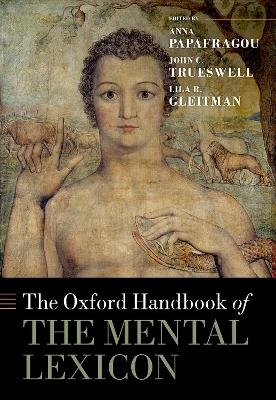
The Oxford Handbook of the Mental Lexicon
Oxford University Press (Verlag)
978-0-19-884500-3 (ISBN)
This volume brings together the latest research from leading scholars on the mental lexicon - the representation of language in the mind/brain at the level of individual words and meaningful sub-word units. In recent years, the study of words as mental objects has grown rapidly across several fields, including linguistics, psychology, philosophy, neuroscience, education, and cognitive science. This comprehensive collection spans multiple disciplines, topics, theories, and methods to highlight important advances in the study of the mental lexicon, identify areas of debate, and inspire innovation in the field from present and future generations of scholars.
The book is divided into three parts. Part I presents modern linguistic and cognitive theories of how the mind/brain represents words at the phonological, morphological, syntactic, semantic, and pragmatic levels. This part also discusses broad architectural issues pertaining to the internal organization of the lexicon, the relation between words and concepts, and the role of compositionality. Part II examines how children learn the form and meaning of words in their native language, bridging learner- and environment-driven contributions and taking into account variability across both individual learners and communities. Chapters in the final part explore how the mental lexicon contributes to language use during listening, speaking, and conversation, and includes perspectives from bilingualism, sign languages, and disorders of lexical access and production.
Anna Papafragou is a Professor in the Department of Linguistics at the University of Pennsylvania and the director of the University's interdisciplinary graduate program in Language and Communication Sciences. Her research focuses on how children acquire meaning in language, how language is used and understood, and how language interfaces with human perception and cognition. She is an elected Fellow of the Association for Psychological Science and serves on the Governing Board of the Cognitive Science Society. John C. Trueswell is a Professor in the Department of Psychology at the University of Pennsylvania and the co-director of the University's MindCORE initiative in Integrative Language Science and Technology. His research focuses on understanding how children develop the ability to process language in real-time, and how this ability interacts with the acquisition of language. He is an elected fellow of the Association for Psychological Science, the American Association for the Advancement of Science, and the Cognitive Science Society. Lila R. Gleitman is a Professor Emerita of Psychology and (by secondary appointment) Linguistics at the University of Pennsylvania. She has conducted foundational work on language acquisition, and the relationship between language and other cognitive systems. She is an elected member of the National Academy of Sciences, an elected fellow of the American Association for the Advancement of Science, a Fyssen Foundation Laureate, and a winner of the Rumelhart Prize from the Cognitive Science Society.
1: Anna Papafragou, John C. Trueswell, and Lila R. Gleitman: Introduction
Part I: Representing the Mental Lexicon
Part Ia: Form
2: Eric Bakovic, Jeffrey Heinz, and Jonathan Rawski: Phonological abstraction in the mental lexicon
3: Ruaridh Purse, Meredith Tamminga, and Yosiane White: Phonological variation and lexical form
4: David Poeppel and Yue Su: Neural encoding of speech and word forms
Part Ib: Meaning
5: David Embick, Ava Creemers, and Amy J. Goodwin Davies: Morphology and the mental lexicon: Three questions about decomposition
6: Artemis Alexiadou: Syntax and the lexicon
7: Ray Jackendoff: Lexical semantics
8: Valentine Hacquard: Logic and the lexicon: Insights from modality
Part Ic: Interfaces and Boundaries
9: Florian Schwarz and Jérémy Zehr: Pragmatics and the lexicon
10: Kyle Mahowald, Isabelle Dautriche, Mika Braginsky, and Edward Gibson: Efficient communication and the organization of the lexicon
11: Gala Stojnic and Ernie Lepore: Compositionality of concepts
12: Barbara Landau: Language and thought: The lexicon and beyond
Part II: Acquiring the Mental Lexicon
Part IIa: Form
13: Daniel Swingley: Infants' learning of speech sounds and word forms
14: Sarah C. Creel: Learning words amidst speech sound variability
Part IIb: Meaning
15: Katherine Demuth: How learners move from sound to morphology
16: Charles Yang: Systematicity and arbitrariness in language: Saussurean rhapsody
17: Jeffrey Lidz: Children's use of syntax in word learning
18: Lila R. Gleitman and John C. Trueswell: Easy words: Reference resolution in a malevolent referent world
19: Stephen Crain: Early logic and language
Part IIc: Interfaces and Boundaries
20: Myrto Grigoroglou and Anna Papafragou: Contributions of pragmatics to word learning and interpretation
21: Christine E. Potter and Casey Lew-Williams: Differences in vocabulary growth across groups and individuals
Part III: Accessing the Mental Lexicon
Part IIIa: Via Form
22: James S. Magnuson and Anne Marie Crinnion: Spoken word recognition
23: Jennifer Rodd: Word meaning access: The one-to-many mapping from form to meaning
24: Rebecca Treiman and Brett Kessler: Learning and using written word forms
Part IIIb: Via Meaning
25: Oriana Kilbourn-Ceron and Matthew Goldrick: The dynamics of word production
26: Nazbanou Nozari: The neural basis of word production
Part IIIc: Interfaces and Boundaries
27: Maria Mercedes Piñango: The structure of the lexical item and sentence-meaning composition
28: Judith Kroll, Kinsey Bice, Mona Roxana Botezatu, and Megan Zirnstein: On the dynamics of lexical access in two or more languages
29: Rachel I. Mayberry and Beatrijs Wille: Lexical representation and access in sign languages
30: Daniel Mirman and Erica L. Middleton: Disorders of lexical access and production
| Erscheinungsdatum | 03.02.2022 |
|---|---|
| Reihe/Serie | Oxford Handbooks |
| Verlagsort | Oxford |
| Sprache | englisch |
| Maße | 175 x 252 mm |
| Gewicht | 1576 g |
| Themenwelt | Geisteswissenschaften ► Philosophie ► Sprachphilosophie |
| Geisteswissenschaften ► Psychologie ► Allgemeine Psychologie | |
| Geisteswissenschaften ► Psychologie ► Verhaltenstherapie | |
| Geisteswissenschaften ► Sprach- / Literaturwissenschaft ► Sprachwissenschaft | |
| ISBN-10 | 0-19-884500-6 / 0198845006 |
| ISBN-13 | 978-0-19-884500-3 / 9780198845003 |
| Zustand | Neuware |
| Informationen gemäß Produktsicherheitsverordnung (GPSR) | |
| Haben Sie eine Frage zum Produkt? |
aus dem Bereich


